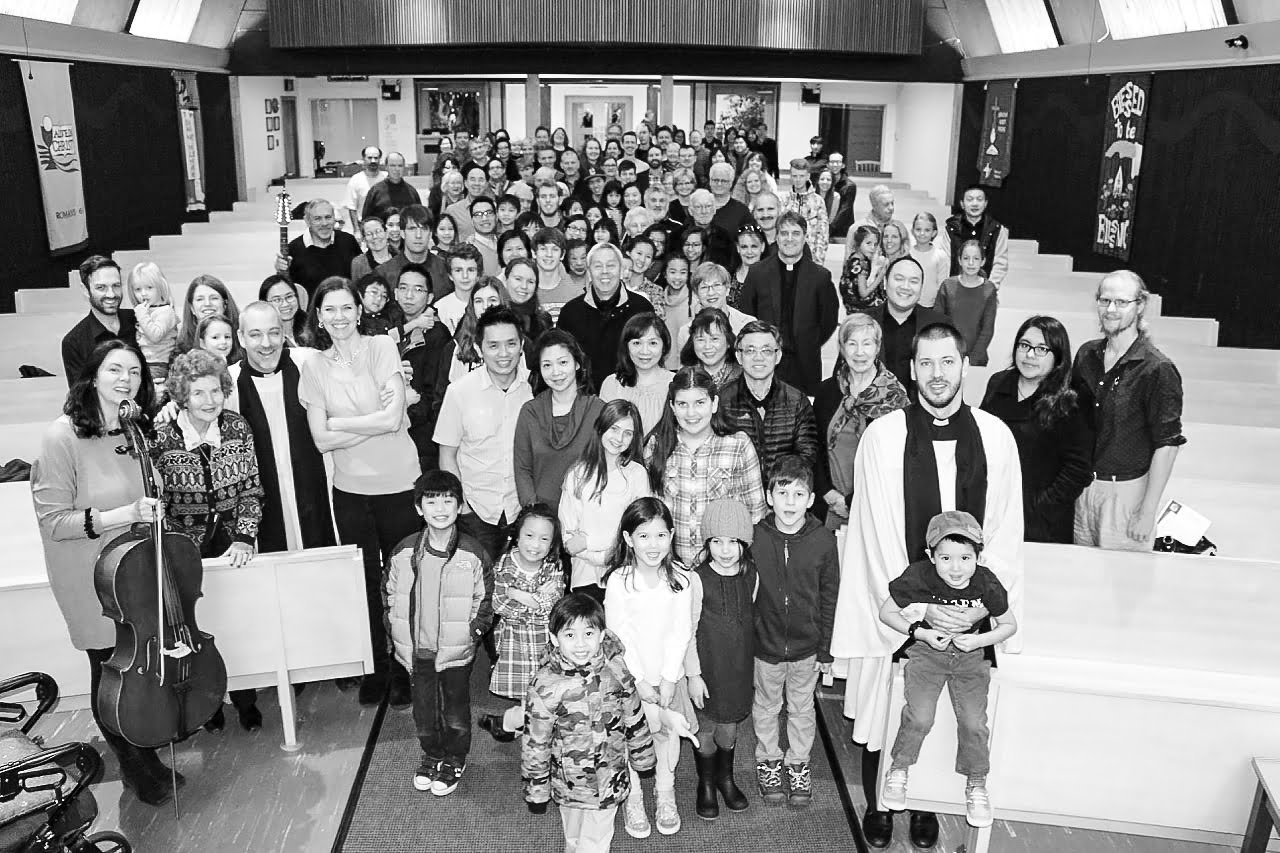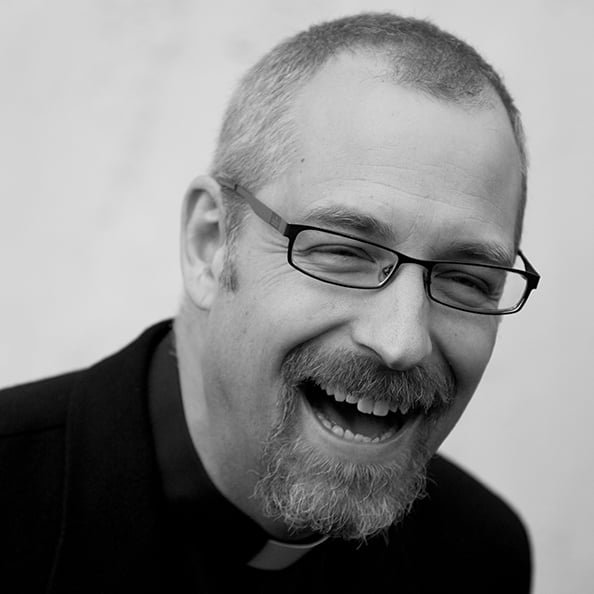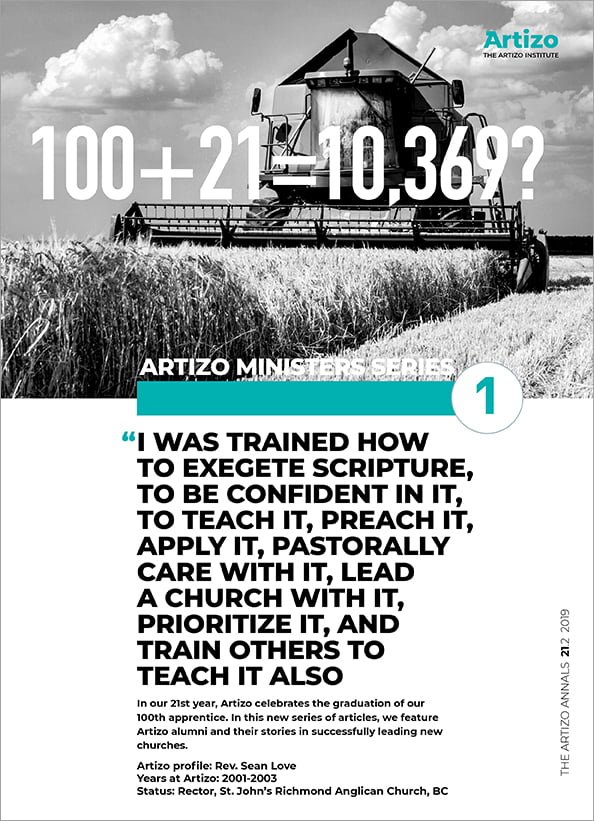“I WAS TRAINED HOW TO EXEGETE SCRIPTURE, TO BE CONFIDENT IN IT, TO TEACH IT, PREACH IT, APPLY IT, PASTORALLY CARE WITH IT, LEAD A CHURCH WITH IT, PRIORITIZE IT, AND TRAIN OTHERS TO TEACH IT ALSO.
In our 21st year, Artizo celebrates the graduation of our 100th apprentice. In this new series of articles, we feature Artizo alumni and their stories in successfully leading new churches
Artizo profile: Rev. Sean Love
Years at Artizo: 2001-2003
Status: Rector, St. John’s Richmond Anglican Church, BC
REV. SEAN LOVE
I was in the Artizo program from 2001 to 2003, when I was about a third of the way through an MDiv at Regent College. Church planting was definitely not on the table, although my wife Penny and I had dreamed about what an imperfect-but-faithful church could look like. I had no idea what God was about to teach me.
In 2003, the Anglican Communion was being torn apart, and the Diocese of New Westminster was ground-zero for theological revisionism and upheaval. Being in Artizo was about as front-row as you could get to the Anglican realignments that were happening. It was not an auspicious time to plant an Anglican Church! St. John’s Vancouver had even been explicitly warned by the Diocese not to plant churches. So it was humanly impossible – and could jeopardize both my own ordination and the sensitive work of realignment into new Anglican structures.
God’s word is so powerful that I directly received the church planting idea from the preaching of the Word. St. John’s Vancouver was working through a preaching series in Acts where church planting is a product of the unhindered spread of the Gospel from Jerusalem, to Judea, and Samaria, and to the ends of the earth. Following a conversation with David Short, I began a prayer group at St. John’s for people interested in church planting. We met regularly for six months, praying generally for the Lord’s vision, and then prayed for clarity on potential locations.
With Artizo, I was able to work out my theological understanding of the church and church planting through Bible study, other readings, and especially my ongoing discussions with my Artizo trainer in my one-on-one meetings.
With a core group from St. John’s Vancouver we eventually planted a church in Richmond. Finding a location was a miracle. We knew someone who knew the pastor of a Baptist church that had turned down other requests from churches for space. But they had heard of the public stand for biblical Christianity many Anglicans took, even at the expense of properties, and they were glad to welcome us.
And it was wonderful to see the way the Holy Spirit brought people to us, either who were not yet believers, or insecure in their faith, or not currently attending a church. The constant task of the church is to preach the living Word of the living God. By keeping this a priority on Sunday mornings, through Bible-in-a-Day seminars, weekly small groups, and in children’s and youth ministries, we have a culture where people are confronted – and converted – by the good news of Jesus Christ applied to our lives today.

We fund the way most churches fund: desperate prayer! And teaching on generosity as a response to God’s goodness to us. By the third year we were completely self supporting, and have been since then.
Artizo helps to integrate theological studies into a coherent, biblically faithful model for ministry in any church. Artizo augments academic theological training by coaching pastoral ministry within a robust biblical mindset. Artizo puts apprentices into regular, systematic contact with competent experienced trainers, a thorough program of study, and reinforces the ministry of God’s Word and prayer. There is no other solid ground for ministry and mission today. The danger for the Church is to fall back on technique, personal charisma, and a different gospel; Artizo graduates are convicted through Scripture to aim at which the Apostle Paul aims: “Christ we proclaim, warning every one and teaching every one in all wisdom, that we may present every one mature in Christ.” (Colossians 1:28)
Handling Scripture competently by example and practice is the critical thing that Artizo brought to my training as a minister: Learning from the examples of other competent ministers, I was trained how to exegete Scripture, to be confident in it, to teach it, preach it, apply it, pastorally care with it, lead a church with it, prioritize it, and train others to teach it also. Through this training about how to rightly handle the word of truth, I was helped, ultimately, to grow in my appreciation and worship of the living God, to know personally the light and life of Jesus, and by his Spirit to communicate that love and truth to others.
One of the best things was the weekly Artizo discipline of preaching short sermons to the rest of the apprentices in our group. It was very practical and hands-on. Each person gave their micro-sermon, and then the group graciously sharpened one another through immediate feedback and encouragement.
When the Artizo Curacy program first started we were the first to jump on board. We had just walked Ben Roberts through his ordination process and were looking for a way to bring him on staff at St. John’s Richmond. The Curacy program was the kick-start we needed. The matching-funds arrangement was excellent as the congregation had to put ‘skin in the game’ by increasing our budget to match the amount Artizo was offering. After two years of Artizo funding, the church raised the full amount for Ben’s salary and he continued ministering at SJR for several more years.

The Curacy program is crucial for placing qualified Artizo graduates into Canadian churches that need a little push to extend their ministry. And, it’s very good for the Artizo Curates themselves as it helps them get started in paid ministry, and gain good experience and wisdom working with more seasoned clergy. The Curacy program extends the Artizo model of mentorship into a new setting to further grow the seed Artizo has planted.
The generosity of Artizo donors has multiplied over time. Without the good grounding of Artizo training, I would certainly have been less well prepared for long term, full time Christian ministry. I’m painfully aware of my own deficiency, but without Artizo I would be far more confused, insecure, apprehensive, and susceptible to counterfeit teaching. To have started out and continued in ministry without the God-given wisdom granted to me through Artizo would have been, in my case at least, a nightmare.
We continue to identify and train people in our congregation to teach the Bible. But they need to learn the Bible, and trust the Bible also. So, the regular preaching of the Word is so important for grounding in the patterns and practices of reading the Bible well. At SJR we have developed a day long seminar called Bible-in-a-Day, where we show participants how the Bible coheres as one big story, focused on the King and His rule and people. It has been a great way to help people put the parts of the Bible into the whole. This creates confidence in the Word, and engages people with the story the Word, which helps us to share that story with others.”
100 + 21 = 10,369? Supernatural math? We now have 100 Artizo graduates trained over the last 21 years, the majority of whom are in full time ministry. The product of the formula is an educated guess at the number of people who regularly listen to an Artizo minister teach and preach. With God’s help, Artizo will continue to obey the New Testament imperative of entrusting the Gospel to faithful men. We continue to trust God for supernatural results.

Rev. Sean Love serves as Rector at St. John’s Richmond Church in Richmond, B.C. He is a Vancouverite by birth and trained in geography and high school education. He lived in New Mexico for nine years where he was a youth minister and high school teacher. Sean returned to Vancouver in 2002 and completed his MDiv at Regent College, as well as an internship with Artizo. He is married to Penny and has three sons, Graham, Thomas, and Dylan.
